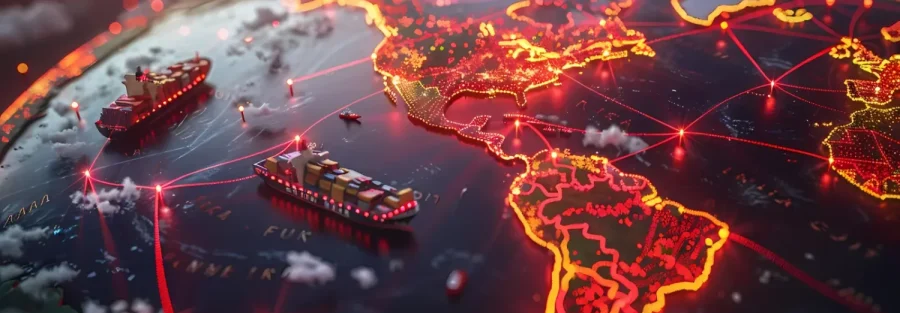The silent revolution reshaping global trade from the most unexpected places
A new form of economic warfare is being waged from suburban Pakistani homes, and the traditional business world doesn’t even know it’s happening.
While multinational corporations debate supply chain strategies and governments negotiate trade agreements, thousands of Pakistani entrepreneurs have quietly built a parallel global economy that operates by entirely different rules. They’ve created what can only be described as “Quantum Businesses”, enterprises that exist simultaneously across multiple countries, jurisdictions, and economic systems without conforming to traditional business geography.
The Architecture of Impossibility
These aren’t typical import-export businesses or traditional e-commerce operations. They represent something unprecedented: a four-country business model that exploits regulatory, economic, and operational differences across continents.
Pakistan serves as the strategic brain, where decisions are made, marketing is crafted, and operations are coordinated. It leverages ultra-low costs and educated English-speaking talent.
China provides the manufacturing muscle, Factories in Guangzhou and Yiwu produce goods at costs impossible elsewhere, with suppliers who’ve learned to work with Pakistani partners they’ve never met.
UAE acts as the financial nervous system, Dubai’s free zones offer tax optimization, advanced banking infrastructure, and regulatory legitimacy without requiring physical presence.
UK functions as the market gateway, providing access to affluent consumers, established platforms, and the credibility that comes with British business registration
The Economics of Geographic Arbitrage
The financial mathematics are staggering. A product manufactured for 4 dollars in China sells for 35 pounds in the United Kingdom, with Pakistani entrepreneurs capturing 8 to 15 pounds profit per unit. This happens while they operate on monthly expenses equivalent to what their Western counterparts spend on coffee.
This is not about exploiting cheap labor. It is about exploiting geographic inefficiencies in the global economy. These entrepreneurs have discovered that value creation no longer requires physical proximity to markets, suppliers, or customers.
The Scale of the Silent Revolution
Pakistan’s e-commerce market is expected to exceed 5.9 billion dollars in 2025, reflecting the momentum already evident across Amazon, TikTok Shop, and regional platforms. Meanwhile, the global cross-border e-commerce market is projected to reach 1,628.66 billion dollars by 2033.
Pakistani entrepreneurs are capturing a disproportionate share of this growth through their innovative four-country model.
They now command access to hundreds of millions of customers across multiple global platforms. Beyond Amazon, eBay, and Shopify, Pakistani entrepreneurs are expanding into platforms like TikTok Shop, Temu, and regionally dominant marketplaces such as Noon, Salla, and Zid.sa, which offer direct-to-consumer engagement and lower entry barriers.
Simultaneously, Middle Eastern markets such as Saudi Arabia, Kuwait, and Qatar are gaining momentum as lucrative new frontiers. Sellers are leveraging UAE-based registrations and fulfillment hubs to serve the Gulf, capitalizing on rising demand, fast delivery expectations, and cultural proximity.
The Cultural and Infrastructure Revolution
This economic model is reshaping Pakistani society in profound ways. Traditional social hierarchies based on family background or educational credentials are being challenged by digitally enabled entrepreneurs. A 25-year-old managing global listings from their bedroom can outpace the earnings of seasoned corporate executives and established business owners.
The generational divide is striking. Parents who spent careers building conventional businesses struggle to understand how their children generate substantial income from what appears to be playing on computers.
Success has driven infrastructure development that surpasses government initiatives. Pakistani cities now boast fiber optic coverage rivaling European capitals, not due to state planning but because entrepreneurs need to upload hundreds of product images daily.
To stay globally competitive, these entrepreneurs now use artificial intelligence tools for product research, listing optimization, customer messaging, and pricing strategy. What once required teams of assistants or outsourced freelancers can now be done by a single operator using intelligent automation, boosting productivity and slashing operational costs.
In 2025, many Pakistani entrepreneurs are integrating generative artificial intelligence to automate ad creation, localize listings across multiple languages, and even deploy custom chatbots for global customer engagement. This further collapses traditional barriers to scaling.
The Rise of an E-Commerce Education Ecosystem
Pakistan’s e-commerce education ecosystem has matured rapidly. Over a dozen specialized platforms now offer more than 150 advanced courses tailored for cross-border commerce. International trainers frequently host workshops across major cities, creating knowledge-sharing networks that did not exist five years ago.
The Global Implications and Regulatory Vacuum
This phenomenon challenges fundamental assumptions about economic development and international trade. Countries can now export human capital without losing it to emigration. Individuals can access global markets without massive capital investments. Competitive advantage can be created through knowledge and coordination rather than physical assets.
Perhaps most significantly, this operates in a regulatory gray area that existing frameworks struggle to address. How do you classify a business registered in the United Kingdom, sourcing from China, processing payments through the UAE, and operating from Pakistan? Which country’s labor laws apply? How are taxes calculated?
These questions affect billions of dollars in economic activity and thousands of livelihoods. The answers will shape how global commerce evolves in the coming decades.
Saudi Arabia’s Vision 2030 and the New Frontier
Markets like Saudi Arabia are rapidly becoming central to this model. With high consumer spending, improved payment systems, and regional demand for fast delivery, the Kingdom offers significant new potential.
This shift is also aligned with Saudi Vision 2030, which prioritizes digital transformation, e-commerce growth, and the expansion of non-oil sectors. Pakistani sellers are using Dubai-based setups to expand into the Saudi market more directly, establishing Gulf-focused commerce pipelines that support the Kingdom’s ambition to become a regional logistics and trade hub.
The Uncomfortable Questions
This revolution raises profound questions that institutions haven’t addressed:
- How do traditional concepts of business location apply when operations span multiple continents?
- What happens to local employment when individuals can access global income streams?
- How do governments adapt frameworks to businesses existing simultaneously in multiple jurisdictions?
- What defines economic citizenship when entrepreneurs contribute to multiple economies without traditional physical presence?
The Silent Revolution
While economists debate trade theories and politicians negotiate international agreements, Pakistani entrepreneurs are quietly rewriting the rules of global commerce. They are proving that in the digital age, the most significant economic disruptions often happen not in boardrooms or government offices but in bedrooms and living rooms.
This invisible empire continues to grow, powered by human ingenuity, digital connectivity, and the recognition that traditional boundaries exist only if you choose to be limited by them.
The future of commerce is not being negotiated in trade talks. It is being built one cross-border transaction at a time by entrepreneurs who refuse to accept that geography determines economic opportunity.
The Most Profound Revolutions Begin Quietly
The most profound revolutions often begin quietly, in the most unexpected places, by people who simply refuse to accept existing limitations.
The Pakistani e-commerce phenomenon is not just changing how business works.
It is changing how we think about work, geography, and opportunity itself.
The question is not whether this model will spread globally.
It is how quickly traditional institutions will adapt to a world where the most successful businesses might be the ones you never see coming.




